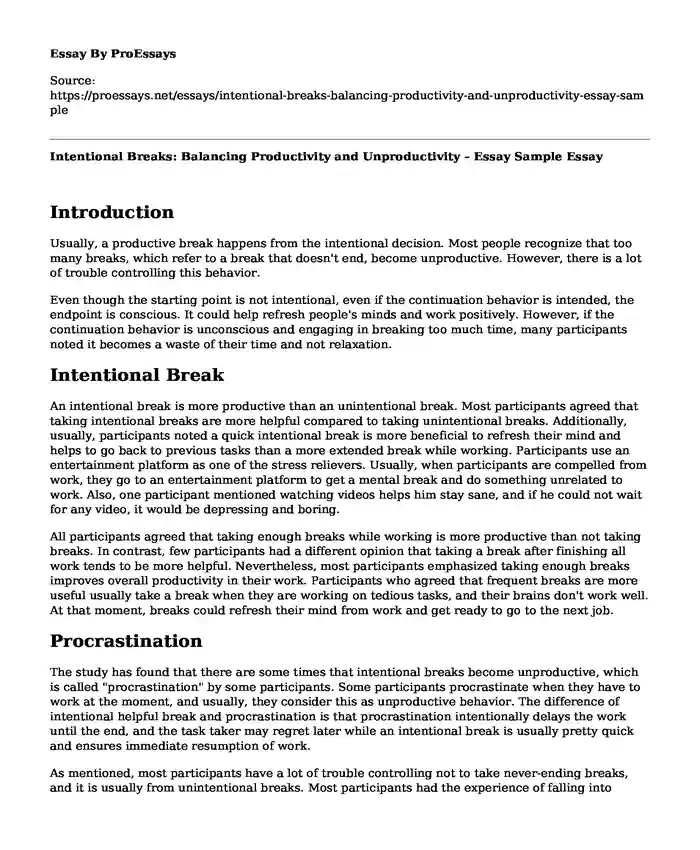Introduction
Usually, a productive break happens from the intentional decision. Most people recognize that too many breaks, which refer to a break that doesn't end, become unproductive. However, there is a lot of trouble controlling this behavior.
Even though the starting point is not intentional, even if the continuation behavior is intended, the endpoint is conscious. It could help refresh people's minds and work positively. However, if the continuation behavior is unconscious and engaging in breaking too much time, many participants noted it becomes a waste of their time and not relaxation.
Intentional Break
An intentional break is more productive than an unintentional break. Most participants agreed that taking intentional breaks are more helpful compared to taking unintentional breaks. Additionally, usually, participants noted a quick intentional break is more beneficial to refresh their mind and helps to go back to previous tasks than a more extended break while working. Participants use an entertainment platform as one of the stress relievers. Usually, when participants are compelled from work, they go to an entertainment platform to get a mental break and do something unrelated to work. Also, one participant mentioned watching videos helps him stay sane, and if he could not wait for any video, it would be depressing and boring.
All participants agreed that taking enough breaks while working is more productive than not taking breaks. In contrast, few participants had a different opinion that taking a break after finishing all work tends to be more helpful. Nevertheless, most participants emphasized taking enough breaks improves overall productivity in their work. Participants who agreed that frequent breaks are more useful usually take a break when they are working on tedious tasks, and their brains don't work well. At that moment, breaks could refresh their mind from work and get ready to go to the next job.
Procrastination
The study has found that there are some times that intentional breaks become unproductive, which is called "procrastination" by some participants. Some participants procrastinate when they have to work at the moment, and usually, they consider this as unproductive behavior. The difference of intentional helpful break and procrastination is that procrastination intentionally delays the work until the end, and the task taker may regret later while an intentional break is usually pretty quick and ensures immediate resumption of work.
As mentioned, most participants have a lot of trouble controlling not to take never-ending breaks, and it is usually from unintentional breaks. Most participants had the experience of falling into immersion with entertainment while working. Often unintentional break lead to participants spending a lot of time on it, without any consciousness. This behavior becomes unproductive and a waste of time. Even though participants are aware of this behavior, they mentioned it is hard to control this behavior, but they all desire to reduce it. Also, if the trigger behavior was intentional, the continuation behavior becomes unintentional. This scenario made participants spend too much time for breaks, and after realizing the amount of time wasted, they got a negative emotional state.
Conclusion
Thus, frequent breaks could help to refresh the mind. However, if the frequent breaks total amount of time becomes more than the total amount of time spent working, many participants think it is not helpful and not productive from a work perspective in general. The work time should be much more than break times so that the frequent breaks can get allowed for relaxation.
Cite this page
Intentional Breaks: Balancing Productivity and Unproductivity - Essay Sample. (2023, Nov 16). Retrieved from https://proessays.net/essays/intentional-breaks-balancing-productivity-and-unproductivity-essay-sample
If you are the original author of this essay and no longer wish to have it published on the ProEssays website, please click below to request its removal:
- Essay Sample on Mental Health and Depression
- ADHD Disorder - Essay Sample
- Ageing and Ethnicity Paper Example
- Unraveling the Mystery of Creativity: Beyond Logic & Imagination - Essay Sample
- Essay on My Objectivist Beliefs: How Self-Interest, Reason, Capitalism, and Reality Unify
- Postpartum Depression Screening: An Essential Activity - Essay Sample
- Essay Example on Second Language Learning: Cognitive & Affective Factors







